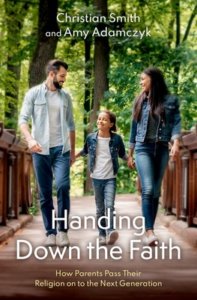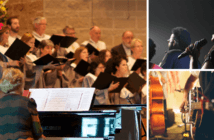What determines whether children will carry on the faith of their parents? Past research established that parents play the critical role. Ann Michel of the Lewis Center staff interviews noted sociologist Christian Smith about new research examining how parents shape their children’s faith and the critical factor of talking about religion in the context of day-to-day life.
Listen to this interview, watch the interview video on YouTube, or continue reading.
Ann Michel: Your new book, Handing Down the Faith, co-written with Amy Adamchyk, builds on previous research by yourself and others which finds that the role of parents is the most critical factor in determining whether their children will continue to practice the faith they were raised in when grown. Could you explain that backdrop?
Christian Smith: I spent a lot of years studying the religious lives of teenagers and then 20-year-olds and what affected them. There’s a broader cultural narrative suggesting that, after kids turn 12 or 13, parents don’t matter anymore. Other factors take over like the media or peers at school. But what we found is when it comes to the longer-term formation of young people, their parents are actually much more important than any other factor — more important than clergy, youth groups, mission trips, pretty much more than anything. It shouldn’t be surprising, although it was surprising initially. Parents have this decisive, really important formative power over how their kids turn out. Teenagers don’t realize that usually, and a lot of parents don’t realize that. But sociologically that’s what goes on. And, of course, this is not determinative. Parents can’t control their kids. Children in different families turn out differently. But as a broad generalization, the lives and the practices and the intentions and the influence of parents is really powerful. So, we followed up that research with a project studying parents themselves and how religious parents tried to approach and shape their kids religiously.
Ann Michel: So, your purpose in this book is to answer the “how” question. How does this transmission of religion from parents to children happen? Can you describe how you examined this in your research?
Christian Smith: It’s not a how-to book, but it’s about how parents approach the task of passing down their faith and how they try to do it. We interviewed 235 religious parents in the United States from different traditions, Christian and non-Christian — Catholic, Protestant, Jewish, Latino Catholic, White Catholic, Mormon, Hindu, Muslim, Buddhist, a whole variety of different kinds of parents — looking for differences. We had these in-depth two and a half-hour interviews with parents. We tried to get parents from different socioeconomic backgrounds, different family structures, single parents, and so on, racial-ethnic differences with black parents. And it was really an exploration from the parents’ perspective. What do they assume? What’s their experience? How do they approach it? What’s their strategy? How did they feel? What’s it like? Because there’s really not a lot of other research on how parents are approaching this task, given how important they are in the process.
Ann Michel: Just to clarify, these weren’t just any parents. They were “religious” parents.
Christian Smith. They were. We sampled our parents through religious congregations, so this is not nationally representative. We interviewed people that have some attachment to a religious congregation. However, we sampled about half who are quite involved in their religious congregations, and the other half who are less involved. We didn’t want to get just the superstars of a church. We wanted to also hear from those who have a little more distance or marginal involvement to see if that made much of a difference.
Ann Michel: One of the interesting findings for me in this research was, even though you looked at a very broad array of different religious traditions, the findings were largely the same whether you were looking at somebody who was Hindu or Mormon.
Christian Smith: Sociologists are used to making comparisons between groups, so we had our antenna up to tune into the differences among the different kinds of parents we sampled. What we actually came across was that the vast majority of religious parents in America — not even just among different Christian traditions and backgrounds — have a very similar approach to their understanding about the value of religion, why it would be good for your kids to be religious, how to go about it, some of the challenges and problems. So, we were really struck by the profound similarities and what we call the “cultural models” that are operating in the background of parents’ minds and forming how they go about this challenge.
Ann Michel: The real banner headline of the book, for me at least, is that most instrumental factor seems to be when parents talk about faith with their children — not just when they’re in the car coming and going from Sunday school or when they’re saying bedtime prayers but when there’s a kind of ongoing narrative just in the course of everyday life. Can you say more about that?
Christian Smith: Yeah, that’s exactly right. So, it wouldn’t be surprising that, for parents who attend religious services more often or for whom personal faith is more important, their kids would turn out to be more religious. That makes total sense. But an even more important variable than those two factors is: “Do parents talk with their children during the week about religious things?” So, if you start to think about it, you can imagine households where they go to church but in the rest of life they don’t talk about faith. It’s just a little, compartmentalized part of life. Or you can imagine families, where in and through ordinary life and conversations, the family talks about: “What does Christianity have to say about this?” “What would the church teach?” They could talk about all sorts of different aspects of this. Just the fact of conversations that bring religion up during the week about presumably ordinary parts of life turns out to be such a powerful correlation. It could be anything — sports, the news, something going on in the family. Children in those families turn out to be more religious as they grow up. We didn’t expect that when we went into it. But it’s just over and over a really powerful factor. So it’s worth really thinking about both in terms of sociology — how and why does that work — but also practically. If parents want to influence their kids to be religious, how to do that? Now we’re not talking about preaching to kids or having the parents read the catechism or something. It appears that it needs to be a much more natural process that just reflects what the parents care about, what they are thinking about, what the family is processing. So, I think that’s a really interesting finding and something worth pondering.
Ann Michel: For parents and church leaders who care about this, it seems like a really important, actionable takeaway.
Christian Smith: In a way, part of what comes out of our study puts a lot of responsibility on parents. The way society has evolved, most of the responsibility for how kids are going to turn out religiously actually falls on the shoulders of parents, for better or worse. Not clergy. Not youth ministers. And that puts a lot of responsibility on parents. It may terrify some parents. But I think it’s important to keep in perspective. It’s not rocket science. You don’t need a Master of Divinity degree to influence your kid’s faith. A lot of it is just being an authentic person of faith where it’s important in your life and talking about that, being open about that, and sharing. Kids are smart. They’re perceptive. For the most part they can see what’s going on. Parents can’t suddenly put on a pious hat and act something that they’re not. So, it’s really just a matter of making this important in life and communicating and living that. And kids pick up on it and it influences them. So really, in the end, we get what we are, not what we hope to be or pretend to be.
Ann Michel: You and Dr. Adamchyk write that “religious language is not mainstream America’s first language. It’s at best a second language. And if children only hear that language one or two hours a week, they never become fluent enough to feel comfortable speaking that language as adults.” That rings so true to me and helped me understand why this ongoing conversation becomes so important.
Christian Smith: A lot of us have had experiences learning languages. And there are two different ways of doing it. One is you have a 45-minute class one day a week and you go in and work on your Spanish or whatever. It’s not very effective. We know that the best way to learn a language is to be immersed in it, to go to the country and be forced to learn it, to have it sort of take over your thinking. That way of learning a second language is much better. So, if you use that analogy, the dominant language of our culture is individualism. It’s competition. It’s consumerism. It’s not Christian Gospel. So, if children are going to learn to have a vocabulary and to be able to express and name parts of their life that have to do with their faith, just like learning Spanish, they need practice. People need to learn words. People need a chance, not just to read it in a textbook, but to talk in ordinary language with people around them who also talk that way. When we studied teenagers, we asked them questions about what they believe. And a lot of them said, “I don’t know. Nobody’s ever asked me that question before.” So, I think part of what’s going on is a lack of context in which people can learn to speak and therefore to think and express the spiritual or religious part of their life. They just need some chance for practice, so that goes back to the earlier point. When children have a chance to do that at home with their parents and in the family context, that’s a totally different way of learning about religious faith and how to think and express it than just listening to church an hour.
Ann Michel: Your research also reveals why parents want to pass on their faith. And largely, it’s not because of the parents’ own deeply held religious beliefs but because parents think that religion is going to help their children be better people or provide moral guidance or provide comfort and support or family unity. As a person of faith, it really struck me that their motivations were largely instrumental and not theological.
Christian Smith. We really liked and were very impressed by the parents we talked with. We don’t want to come off as critical of them. And there’s a lot of really good, impressive religious parents out there in the world who are really trying their best. But a lot of them are not motivated because they want their child to go to heaven or they’re concerned about salvation or they want to honor God or social justice or God’s justice or peace in the world. Most parents said these sorts of larger transcendent or afterlife issues were not the reasons why it’s good to have religious faith or why they want their children to have faith. Life is a journey. Life is hard. Religious faith and practice is like a home base that my child can return to. They provide resources. So the parents had instrumental but very this-worldly sorts of motivations and interests or values of why religion matters: it helps people make good choices; it helps them from doing stupid thing; it provides them guidance. Essentially the master frame is: “Life is a journey. The journey is hard. Religion provides guidance like a map or roadmap. It is a kind of a shelter when things get going really bad.” And so, we came away thinking that what a lot of people in churches probably think they’re providing for their members seems to be different, or there’s a mismatch with what people coming to church are there for. And so, I wonder if that just helps to explain some of the misunderstandings or differences of views of what the church should be doing. We really wanted to bring that out as a chance for people to consider, “What is this all about? Why are people motivated?”
Ann Michel: Given this primary role that parents play in fostering the faith of their children, what’s the main takeaway of the research with regards to the role of faith communities?
Christian Smith: Most parents view their congregations as secondary, in a supportive role, providing some resources. They understand themselves as being the primary socializer. I know from talking to lots of people in church ministry that’s not their view. They think parents drop off the kids and want the church to do it all. But that’s not what we heard from parents. So, there’s another disconnect that I think is worth figuring out. Again, the parents don’t have super high expectations of their religious congregations. They want a place that’s friendly, where their children will have some friends, where there’ll be some enjoyable programming, some sense of community. But they did not place a lot of religious or spiritual or theological or liturgical demands on churches. What they offer is just more of a background or reinforcing factor, not the primary factor. Again, they want just the sense of an enjoyable community that their kids will want to go to for a while.
In another chapter of the book I talk about how I think the larger culture has changed and also the role of religion in it. The model that we used in the old days, so to speak, was what I call “community solidarity.” The function of religion was to bring communities together and help people together. It gave people an identity. There was a community basis for religious formation. And now, I think, that’s transformed into religion as sort of an individual lifestyle accessory or accoutrement — a personal life accessory. So, people may plug into a congregation or think of themselves as religious in the same way they are in a swim club or the YMCA or wear earrings. It’s a plug in and out thing. And it’s much more individualistic. And that changes the character of what a church is and what people are expecting from it.
Ann Michel: Certainly, for me, one of the most interesting messages of the book was this metanarrative about broader societal changes that are impacting the nature of family life and parenting as well as the role of church in society.
Christian Smith: Most people who are tuned in have a sense that, yeah, things really have changed. But it’s a matter of really drilling down and figuring out, “What are the changes? What has caused them? And what are the consequences?” I’m continuing some research along those lines. Also, historic demographic changes in the American nuclear family have been a crucial piece of this as well. The divorce revolution. More and more cohabitation. Delayed marriage. Not getting married. Not having children. All these demographic changes have consequences in whether or not people in their 20s and 30s are going to return to church. That really needs to be understood. It’s not a matter of what the church is offering. It’s a matter of what’s happening around churches in society that changes the situation.
Ann Michel: For me, there was a hopeful message in the book in terms of how invested and instrumental parents are in forming their children. But there was also a pretty disturbing message, I think, about how the institutional church has so much less of a role than we imagine in how children are coming to faith. This research really does call into question some of the standard approaches to the formation of children and youth that are normative in churches today. So, if you were speaking to your own pastor or the Christian education committee in your own church, what would you most want them to know and do based on what you found in this book?
Christian Smith: I’m not a ministry consultant. But the implications of our findings are pretty straightforward and clear. The first thing is, parents should know that this responsibility for how their kids turn out is really on their shoulders. They can’t control their children, but they have a significant degree of influence. So, parents really need to give this thought and ask, “What’s important? What do I really value? What do I want to invest in over the long run?” Another word for that is being intentional. This isn’t just going to happen by accident. Parents really need to be intentional and proactive. Again, it’s not controlling. It’s not being overly manipulative or anything like that but being intentional.
Ann Michel: So, help parents understand the importance of their role?
Christian Smith: Yes. Churches can help parents understand. They can provide context for parents to think and talk about things that some parents are really still working through for themselves. And then, they need to figure out how they can be helpful and supportive of parents during the week and not just provide nice programs. Another way to think about this is that what really, really matters in all of this is relationships not programs. Programs that support relationships and build relationships are good. There’s nothing wrong with programs. But the programs themselves aren’t going to really change anybody. It’s relationships. And so, churches may need to step back and rethink: “How do we connect with families during the week?” Instead of thinking, “Gosh, we’re competing against sports and we’re competing against schools,” maybe there are ways for the church to not be competing but to be out there with the parents on the sidelines talking about how your kid is more integrated out in the world of people, instead of just asking people to come to church buildings for services and programs. I don’t have this all worked out, but I think there needs to be a lot of creative rethinking.
Ann Michel: I really, really appreciate the example you just gave. So much of our thinking in church is “how do we get people to come to church?” But it could be, “how do we go to where life is?” If formation is happening out there every day, it’s a clue for how churches can relate to the lives of children and their parents. My final question is, based on this work, what questions are still in your mind? What more do you want to know? What’s the next field of inquiry these findings have pointed you toward?
Christian Smith: Good question. I’m actually turning my attention now to the more macro social and cultural transformations over the last decades. So rather than studying the religious lives of teenagers or how parents try to pass on faith, I have a project where I’m starting to explore this growth of non-religious Americans and young people that started in the 1990s. They are much less interested in religion than older generations, so I’m trying to explore generational dynamics. What happened in the 1990s and the 2000s? I think those are the two crucial decades, not in churches, but outside — with technology, with the internet, with the end of the Cold War, with neoliberalism. All sorts of dynamics coming in the 80s changed the environment and almost created a different zeitgeist that’s hard to put our fingers on. But it really changed what religion is in the larger picture. And it changed how and why Millennials, Gen Xers and now Gen Z young people respond or don’t respond to religious concerns broadly, but also specifically how they hear or don’t hear the Christian Gospel, the Christian narrative. So that’s what I’m focused on. What is the larger environmental context? And how do we explain this new spiritual sector that’s not totally secular and is not totally spiritual. It’s not religious. It’s not institutional religion. There’s a strong “spiritual dimension,” but it’s not spiritual in the way historically the church would apply the word. It’s just a weird mixture. So, I’m trying to figure out what brought that into being and what it means.
 Christian Smith and Amy Adamczyk are authors of Handing Down the Faith: How Parents Pass Their Religion on to the Next Generation (Oxford University Press, 2021), available at Cokesbury and Amazon.
Christian Smith and Amy Adamczyk are authors of Handing Down the Faith: How Parents Pass Their Religion on to the Next Generation (Oxford University Press, 2021), available at Cokesbury and Amazon.
Related Resources
- How Parent Help Children Grow in Faith by Ann A. Michel
- Helping Youth Have a Faith of Their Own by Lovett H. Weems Jr.
- The New Church Family by Ann A. Michel






